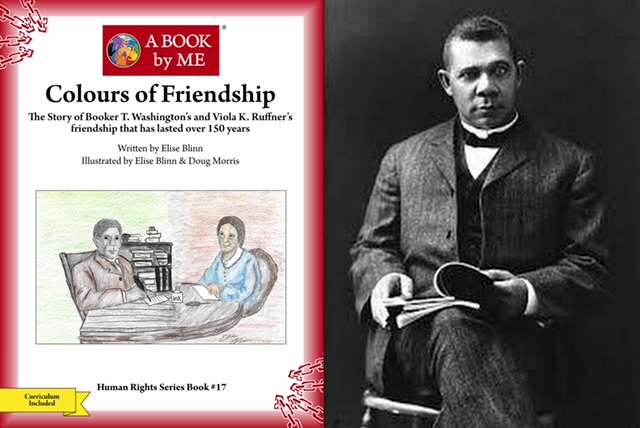Colours of Friendship:
The Story of Booker T. Washington and Viola K. Ruffner
Written and Illustrated by Elise Blinn
Co-Illustrator Doug Morris
For the series A BOOK by ME - True Stories Written by Kids for Kids
Since I was in elementary school in the 1960s, I’ve loved and admired Booker T. Washington. I learned he was born enslaved in the south. His mother cooked for the owner of the plantation and his white father was unknown to Booker. When the Civil War ended, nine year old Booker and his mother were freed. They moved to West Virginia, mom married a free black man and Booker took the last name Washington from him.
What I didn’t know is this is where he had a serendipitous meeting with a woman named Viola Ruffner. As I met with her descendants, I was in awe learning of the annual Ruffner/Washington reunions. Booker and Viola, born decades apart, became the best of friends. She began the education process and encouraged him to go higher. I doubt Viola had any idea just how many people, including me, he would inspire.
To think that his descendant and hers worked on this book together is awesome. I hope students reading this book learn to love Booker and his good friend Viola.
Deb Bowen
A BOOK by ME
 “If you read any of Booker T. Washington’s works, you will find that his message is this: through education, cooperation and hard work, you can achieve equality. Respect and friendship go hand in hand with this idea. If everyone would follow Booker’s philosophy, the world would certainly be a better place for people of all cultures!” Author Elise Blinn
“If you read any of Booker T. Washington’s works, you will find that his message is this: through education, cooperation and hard work, you can achieve equality. Respect and friendship go hand in hand with this idea. If everyone would follow Booker’s philosophy, the world would certainly be a better place for people of all cultures!” Author Elise Blinn
Author/Illustrator Elise Blinn is a 10th generation descendant of Peter Ruffner, her pioneer ancestor who was born in Switzerland and came to America in 1732.
 “Co-illustrating this book has made me feel closer to my great ancestor and my wish is for this book to help keep his amazing legacy alive, for future generations.” Co-Illustrator Doug Morris
“Co-illustrating this book has made me feel closer to my great ancestor and my wish is for this book to help keep his amazing legacy alive, for future generations.” Co-Illustrator Doug Morris
Co-Illustrator Douglass Morris Washington II is a descendant of both Booker T. Washington and Frederick Douglass through the union of his great grandparents. Nettie Washington (granddaughter of Booker T. Washington) and Dr. Frederick Douglas (great grandson of Frederick Douglass)
“Colours of Friendship” is available on Amazon >>
Colours of Friendship: Viola K. Ruffner & Booker T. Washington
Viola Knapp Ruffner and Booker T. Washington grew up in very different worlds. Viola grew up with strict Puritan ethics in the north where slavery was not accepted. Booker, a determined individual, grew up as a slave in the south. Viola moved to West Virginia before slavery was abolished and Booker moved to Virginia after slavery was abolished. That was when their lives merged and their friendship began. Viola helped Booker learn to read and write and gave him several books to start his own library. Booker went on to become an important Equal Rights leader and always referred to Mrs. Viola Ruffner as his best friend. This friendship had such a strong bond that it has lasted over 150 years as it continues on, through today, with the Ruffner and Washington families.

Viola was born in Arlington, Vermont in 1812. Her father, Silas Knapp, was a cabinetmaker. Even though he possessed remarkable skill and talent, his profession provided a small income. Viola had six siblings so the family was considered financially disadvantaged. She was raised with strict Puritan ethics and possessed high expectations and an outspoken demeanor. Until she was 17 years old, Viola went to school near her home and then began teaching twenty six weeks a year. After that, she attended the Bennington Academy for three years where she was educated as a school teacher. Once she graduated, she remained at the academy and taught for two more years. She then moved to North Carolina where she continued teaching and eventually moved on to head a secondary English department in the State of New Jersey. Viola started her own school, but became ill and had to leave the school. While she was recuperating from her illness, she applied for and accepted a job as a governess for General Lewis Ruffner, a widower who had several children and lived in the area that is now Charleston, West Virginia. Viola only intended to remain in this position for one season, but after a short time, General Ruffner extended an unexpected marriage proposal to Viola and she accepted. They were married in 1843.
Family stories tell that while living in Virginia, Viola taught in a newly established African-American school. The townspeople disapproved so strongly that they ostracized her by leaving a shop if Viola entered and by refusing to walk on the same side of the street as she. Viola was an outcast, but felt sure that she was doing right by educating the illiterate African-American children and did not allow the townspeople’s actions to cast her down. Viola passed away in 1903 and will always be remembered as a dear friend to Booker as her name is engraved on several of his monuments.
Booker Taliaferro was born a mulatto slave in Franklin County, Virginia. There are no birth records for him so his exact birth date and father’s name are unknown, although it is believed that Booker was born about 1856 and his father was a white man from a nearby plantation. Booker had a step-father named Washington who was owned by a different slave owner. He had a brother Viola K. Ruffner & Booker T. Washington named John and also a sister named Amanda. His mother, Jane, was a plantation cook and his early years were spent in the one room, dirt floor cabin that was used as the plantation kitchen. His bed consisted of a bundle of filthy rags. It was terribly hot in the summer as the plantation food was cooked in the cabin over an open fire, and unbearably cold in the winter as the cabin windows did not contain glass and large gaping cracks were present in the door and walls. As a child, Booker was never allowed to play for he worked from the time he arose in the morning until the time he went to sleep for the night. He always dreamed about learning to read and write.
In spring of 1865, Booker and his family learned that they were freed. A short time later, his step-father sent word that he had obtained a wage-paying job working in the Ruffner salt furnaces in West Virginia. Jane secured a two-horse wagon and loaded it with the little clothing, household goods, and coarse ground corn that they owned. Being in poor health, she rode on the wagon while Booker and the other children walked the 200 mile, two-week journey to West Virginia. Once they were settled in their cabin with Washington in Malden, West Virginia, Booker immediately went to work at the Ruffner salt furnace and coal mines. That is where his dream to read and write started to materialize as he learned to recognize and write the number “18” that identified the salt barrels his step-father and brother packed. He detested the work and continued to have an intense longing for an education.

Booker had heard that Mrs. Viola Ruffner, wife of General Lewis Ruffner, owner of the salt furnaces and coal mines, was a school teacher from Vermont. He decided to ask her if he could work in their house as a servant. She agreed to “let him try,” and Booker moved into the Ruffner house. There was not enough work to keep Booker busy, so being impressed by Booker’s determination for an education and his intelligence, Viola began teaching Booker to read and write. She gave him several books and Booker knocked out the side of a dry goods box, put a shelf in it, and housed his new library. Viola encouraged Booker to attend an outside school as well with Mr. William Davis being his teacher for a short time. When Booker began attending school, it was necessary for him to have a last name so he creatively decided to use Washington, his step father’s first name. Booker had to work many hours during the day and soon had to attend a night school which required him to walk several miles at night in order to receive lessons. In 1872 at age 16, Booker began attending Hampton Normal and Agricultural Institute in Virginia. He continued his friendship with Viola who persisted in encouraging him to obtain an education. Booker graduated in 1875 as Hampton’s top honor graduate. He taught at Hampton for several years and then at age 25, began building the nation’s leading African American institution, Tuskegee Institute. Booker used Mrs. Ruffner’s character-building standards of hard work, cleanliness and order for his plan to build the university.
In his autobiography, Booker writes of Viola, “…I soon looked upon her as one of my best friends.” He also states, “…the lessons that I learned in the home of Mrs. Ruffner were as valuable to me as any education I have ever gotten anywhere since.” Throughout his lifetime, Booker was a major figure in the struggle for equal rights and encouraged equality through education and cooperation. Booker passed away in 1915, but his tireless work and never-ending determination continue to inspire us today.
“I have learned that success is to be measured not so much by the position that one has reached in life as by the obstacles which he has overcome while trying to succeed.” Booker T. Washington




